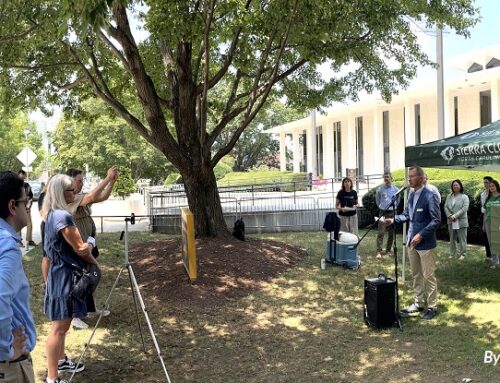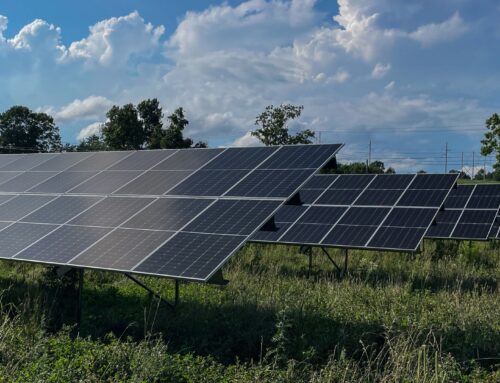Pa. lawmakers consider new state board to fast-track electricity projects
June 27, 2025
Pennsylvania is part of a regional electric grid that’s facing an explosive growth in demand from the electrification of vehicles, industry and new data centers. To get more power on the grid more quickly, Governor Josh Shapiro has proposed a statewide board to streamline the siting of large-scale electricity generation projects. The state legislature and environmental groups are debating the idea.
LISTEN to the story
https://s3.us-east-1.amazonaws.com/media.alleghenyfront.org/AF062725_JG_EnergyBoard.mp3
In early June, Shapiro announced what he called “the largest private sector investment in the history of the Commonwealth of Pennsylvania.” Amazon will be investing $20 billion in multiple new data centers across the state, “that will power our global economy and the future of artificial intelligence,” Shapiro said.
Projects like this are increasing the need for electricity. PJM Interconnections, which operates the electric grid for Pennsylvania, 12 other states and the District of Columbia, predicts that the region’s power needs will grow by nearly 20% in a decade, even as some coal-fired power plants are closing.
Read More
“PJM is telling us that demand is rising and that we have to do something, or we are going to be in a full-blown crisis in Pennsylvania,” said state representative Mandy Steele of Allegheny County at a June 9 hearing of the House Energy Committee.
“My constituents cannot afford to pay the kind of electricity bills that they are going to be hit with if we don’t do something,” she said. “What are we going to do?”
Steele sponsored a bill that is part of Shapiro’s energy plan, which he calls the Lightning Plan, to get more power on the grid by creating a seven-member board, called the RESET board, to approve the siting of large-scale energy generation projects.
Adam Walters, energy advisor in the Department of Community and Economic Development, told the Committee that Pennsylvania is “one of only 12 states in the nation that does not have statewide authority over siting for any key energy projects. Instead, it’s a patchwork of local authorities.”
Walters said developers of large-scale electricity generation projects, whether they’re building a coal- or gas-fired power plant, a solar field or wind farm, could fast-track their projects by getting approval from the RESET board.
“The new, optional process will help projects avoid delays and help projects get built in a reasonable amount of time,” he said.
Projects that get board approval would still need all the required permits.
Opposition from local governments and some environmental groups
Concerned local government groups testified that the new board could usurp their zoning authority over energy projects in their communities.
“We want local government to be making these decisions,” said Martin Causer, Republican Chair of the House Energy Committee, of north central Pennsylvania, at the June 9 hearing. “They know the area, they know the issues, and I think that local control and local input is vitally important – more than just having a public hearing.”
That also concerns Megan McDonough, state director of Food and Water Watch Pennsylvania, who wrote a letter condemning the new board, signed by 25 environmental groups. She has worked with many local communities to create zoning codes that restrict fracking and the gas-fired power plants it supplies from being sited too close to neighborhoods.
“I came to this work doing exactly what this bill would strip away,” she said, referring to what she sees as the centralized authority of the state board.
McDonough also fears that the board will expedite new fossil fuel projects, such as plants that burn natural gas from fracked wells in the region, and doesn’t think the risks are worth it.
“You’re going to obliterate the remaining parts of southwest Pennsylvania [with fracking], is what you’re going to do,” McDonough said. “Just to have data centers for this fabricated demand.”
Help for solar projects
Some Republican lawmakers said the electricity siting board would be a giveaway to the solar industry. At another Energy Committee hearing, on June 11, Representative Causer questioned whether the “state knows best” when it comes to siting energy projects, and asked renewable energy industry leaders, “Do you really believe that the local government officials are the holdup in this process, are they really stopping energy projects across this Commonwealth?”
Nick Cohen, president of Philadelphia-based Doral Renewables LLC, which is currently building solar projects in Ohio and Indiana, both in the PJM transmission system, and employing nearly 2,000 people, testified that local input is important in shaping a project. “There’s a lot of good leadership out there,” he said. “But, there are many instances where just one local official is enough to shut it down. You can convince 99% of the people, and 1% is all it takes to end the project.”
Solar projects have been canceled or held up in Luzerne, Jefferson, Washington and Westmoreland counties, and elsewhere. For example, a farmer and his neighbors near Gettysburg in Adams County opposed a massive solar project proposed for their rural community. The Commonwealth Court sided with the residents, ruling that the project plans did not meet local zoning standards.
Communities sometimes express concerns about issues such as property values and tourism impacts. There is also misinformation online.
David Masur, executive director of the non-profit PennEnvironment, supports the new RESET board because it would give solar developers some recourse when a few individuals drum up opposition to their projects.
“If we’re going to solve climate change, we have to get off of fossil fuels, and the way you get off fossil fuels is you need clean, renewable energy sources,” he said. “One of the big problems we see right now in Pennsylvania is big projects that could power thousands and thousands of homes with clean energy; those clean projects are getting crushed.”
The House Energy Committee is currently working on amendments to include more local input when the state board is considering a project, and may consider the bill again this fall.
Search
RECENT PRESS RELEASES
Related Post



![Pressing for more wind and solar power in Pennsylvania [opinion]](https://stockwatchindex.com/wp-content/uploads/2025/06/Election_2024_Clean_Energy_17658-Puw4Dx-500x383.jpeg)
